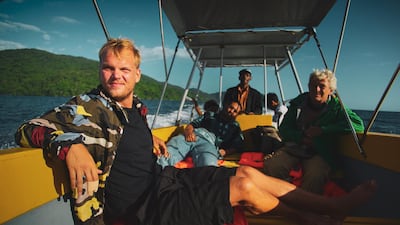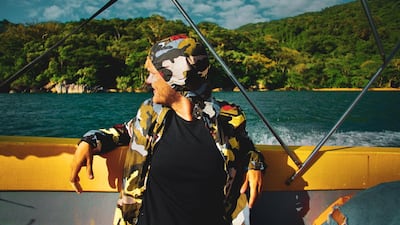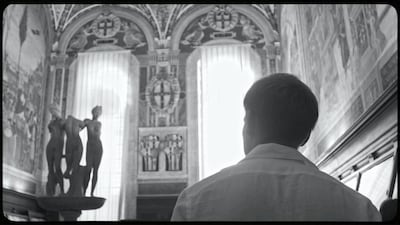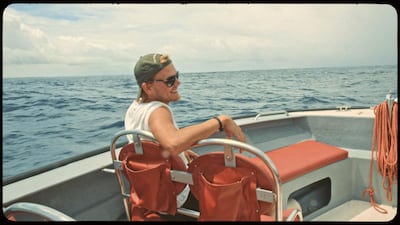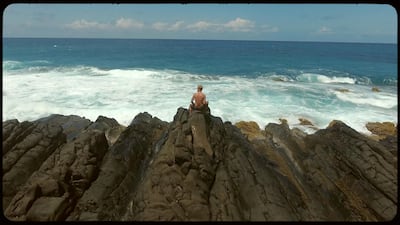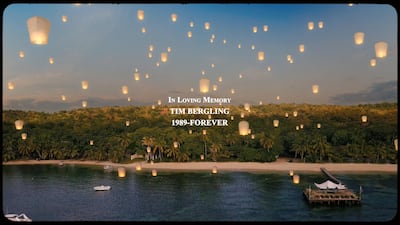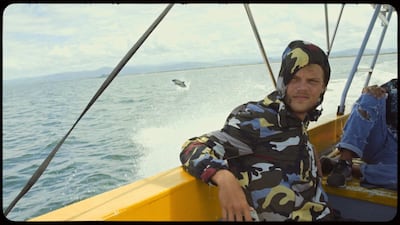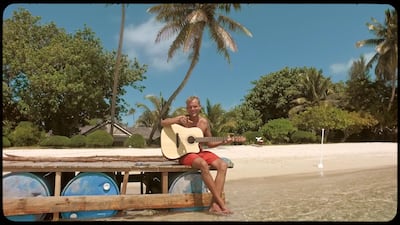When Avicii retired early from his frenetic touring career after a soaring 2016 set at Ibiza super-club Ushuaia, he had his mind set on visiting another island. A few days later, he hopped on a plane for a solo trip to Madagascar, off the coast of East Africa.
The plan was simple: rest, recuperate and replace the cacophony of clubs and crowds with the cool sounds of nature. Every few days, he would visit another town on the island and indulge in sightseeing, swimming and a good dose of hiking.
When he got to Ile Sainte Marie, an island off the east coast of Madagascar, he was so taken with it that he wanted to share its turquoise waters with a friend, so he called the man who had been with him in the electronic dance music trenches. Swedish-Georgian film director Levan Tsikurishvili didn't think twice. He packed his bags and cameras and joined Avicii (real name Tim Bergling) a few days later. They chilled on beachside hammocks, cracking jokes and playing Monopoly.
It was a break that was well earned; Tsikurishvili had been Avicii's virtual shadow for the past few years of his career. He followed him through the hundreds of clubs and festivals he performed at, and spent hours with him on planes, at hotels and in his Sweden and Los Angeles homes, piecing together footage that would eventually become the documentary Avicii: True Stories.
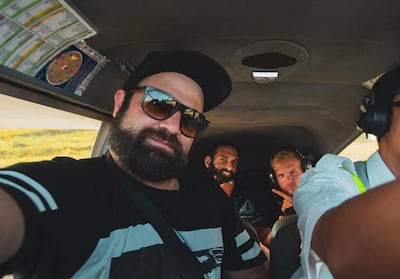
Released in October 2017 and available to stream on Netflix, the film is an unflinching portrayal of a young artist struggling with the demands of fame. Avicii took his own life six months after the documentary was released, in April 2018. The talented DJ was only 28 when he died in Muscat, Oman.
But Tsikurishvili says Avicii was happy and at peace during those 19 days spent in Madagascar, less than two years before his death. "He was in a great place mentally when I saw him," he tells The National. "He was in good spirits and also very reflective. We would sit together, laugh and joke around, and at the same time he was interested in analysing his life and what we both went through together over the years."
It was in Madagascar that Avicii gave his final on-camera interview to Tsikurishvili, which went on to form part of the documentary.
'He was scared of being forgotten'
Deeply affected by the artist's death, and with hours of unused footage of their Madagascar trip, Tsikurishvili decided to honour his friend by returning to the island nation in April and retracing their journey. The end result is the nostalgic and affecting music video – officially approved by the Avicii estate – for the track Heaven. Featuring Coldplay frontman Chris Martin, the song was officially released on June 6, as part the posthumous studio album Tim.
Avicii fans will be familiar with the tune, as it was recorded back in 2014 and the DJ had regularly dropped it in his sets. The accompanying music video, however, is an eye-opener, as it intersperses old and intimate footage (taken on camera and mobile phones) of Avicii unwinding on holiday with freshly shot panoramic images of Ile Sainte Marie. Tsikurishvili says the song follows a long line of Avicii singles that inspire an equal mix of "hope and nostalgia".
While Heaven is a touching tribute to Avicii, Tsikurishvili doesn't view the project as a form of closure. The grieving process, he says, ebbs and flows. "You don't really get over something like this," he says. "What happens is that you need to adjust yourself to live with that new reality. Tim had a very big effect on my life and I understand that it won't change the fact that he is gone, but it is just something I felt like I can do for him."
In one of their candid conversations on the island, Tsikurishvili recalls that Avicii was concerned about his legacy. "He was so worried about that," he says. "He would tell me 'oh man, what will happen now that I have stepped back.' If I am totally honest with you, he was scared of being forgotten."
The EDM scene is a pressure cooker
When in Madagascar, the DJ was only 26, and had a production career still ahead of him, so the fact he feared being forgotten could seem ludicrous, but it actually illustrates the fiercely competitive nature of the EDM industry.
On its surface are the big pay days, the flashy parties and private jets, but once you are familiar with the scene, you find a cauldron of young creatives under pressure to maintain their standing (a DJ's fee is often influenced by the annual DJ Mag Top 100 poll) through constant touring and producing a regular supply of summer club anthems.
This was a world Tsikurishvili was introduced to when he met Avicii at the Stockholm dance music festival Summerburst in 2011. An aspiring full-time DJ at the time, he was at the other end of the line-up, which Avicii headlined.
Tsikurishvili was also working as an in-house director for a Swedish television channel and recalls his interest in the dance music scene as being superficial at best. “I was the same as many of us in that I wanted to live that DJ life with all the parties and jets and money. That’s what I thought it was. And then Tim invited me to work with him and through him I stepped into that world and I realised that it was different.”
“I was the same as many of us in that I wanted to live that DJ life with all the parties and jets and money. That’s what I thought it was. And then Tim invited me to work with him and through him I stepped into that world and I realised that it was different.”
Agreeing on the concept of a warts and all documentary following the life of a DJ on the rise, Tsikurishvili was given unfettered access to Avicii’s life, and from 2013 joined him on all his tours until his retirement.
The first sign that the DJ life wasn’t all glamour came to Tsikurishvili a few days into his first tour with Avicii, which was a run of Australian dates. “My sleep was basically destroyed and I eventually had this understanding that this life is basically a never-ending grind,” he says.
“I mean, look, I am not going to lie to you. The parties are great and you travel the world and see the positive parts of each country, but at the same time you are also dealing with human beings and they just can’t deliver the same result to the fans and industry each night. It is just not possible.”
To illustrate his point, Tsikurishvili recalls the touring route Avicii took on his way to his UAE debut at Dubai's World Trade Centre in 2016: "We started in Spain, then we went to Poland, Russia, some Baltic country I don't remember, Dubai, Beirut, Israel and Italy … and that was in a week."
Tsikurishvili's True Stories documentary shows how such a work rate ate away at the star. In a series of quietly devastating scenes, Avicii shared, almost resignedly, his thoughts on being on the road. "There was never an end to the shows, even when I hit a wall," the DJ says in the opening stages of the film. "My life is all about stress." Later, he offered a more harrowing observation on touring: "It will kill me."
Witnessing his subject mentally fraying behind camera, did Tsikurishvili feel any responsibility to stop the filming and attend to Avicii’s well-being? His response is emphatic.
"Of course. But please don't forget that I was in that world, too. I was trying to look after myself," he says. "This is a stressful environment, man, and the kind of stress he was going through was on my shoulders as well. My job was to sacrifice everything – my private and professional life – and focus on two things: first to just physically and mentally make it, if you know what I mean, and secondly to finish this documentary."
The EDM scene needs regulation: 'it is about keeping our friends alive'
While he and Avicii were pleased at the film’s reception upon its premiere in European cinemas in November 2017 and subsequent arrival on Netflix the following year, Tsikurishvili admits to mixed feelings now that Avicii is gone.
He is satisfied that with Avicii's death, True Stories has been reappraised and is part of a growing conversation about mental health in the dance scene. However, he struggles with the concept that it took the death of his friend to get that movement going. "It honestly makes me feel disappointed that someone has to suffer to that extent for people to finally sit down and listen to each other," he says. "But it shows that Tim, before and after, has changed the music industry in different ways. The fact that people are talking about mental health is positive. But Tim is my friend and collaborator; I still find it hard that all this is happening because he has gone."
But more than industry talk, Tsikurishvili says real change is needed to ensure the future safety of DJs. At present, five of DJ Mag's Top 10 artists are under the age of 35 (Dutch spinner Martin Garrix is the present world number one at the age of 23) and Tsikurishvili says legislation needs to be put in place to prevent further tragedies similar to Avicii.
“The EDM world needs a lot of regulation,” he says. “It is not normal to do 300 shows a year. Artists, no matter how old they are, are human beings and often fragile souls and you just can’t put them under that kind of pressure. Now I am not saying that I know what to do, but there needs to be discussions by people in the EDM world and on a government level for guidelines and legislation.
“I am not talking about taking away people’s freedoms; it is all about keeping all our friends alive.”
